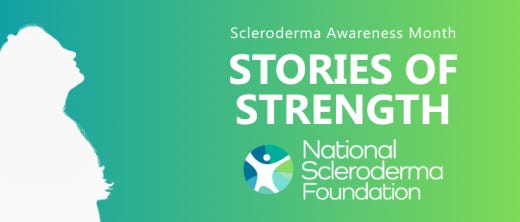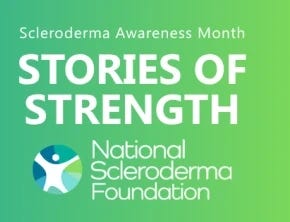Hard Skin, Stronger Spirit: Raising Scleroderma Awareness
June is Scleroderma Awareness Month—a time to shed light on a rare and often misunderstood disease that changes lives far beyond the surface of the skin. For those of us who live with it, scleroderma isn’t just a diagnosis—it’s a daily companion, an invisible burden, and sometimes, a quiet teacher.
I was 29 when I first noticed the signs. My fingers would turn white and tingle in the cold, even during mild weather. I dismissed it for months—too busy with work, with family, with life. It wasn’t until the stiffness, the fatigue, and the tightness in my skin became impossible to ignore that I saw a doctor. It took over a year of bouncing between specialists before I heard the word scleroderma—a condition I had never even heard of, let alone knew how to pronounce.
Scleroderma, meaning “hard skin,” is an autoimmune disease where the body produces too much collagen. It can harden the skin and connective tissue, but it doesn’t stop there. For many of us, it affects the lungs, heart, digestive system, and more. It is unpredictable, incurable, and varies wildly from person to person. Some live with relatively mild symptoms; others face life-threatening complications.
For me, the hardest part wasn’t the physical pain—it was the disbelief. Because I didn’t “look sick,” people assumed I was exaggerating or just tired. Friends grew frustrated when I canceled plans. Coworkers gave me sideways glances when I needed more breaks or time off for appointments. It’s difficult to explain why climbing stairs feels like a marathon when your face still holds a smile.
But slowly, I’ve built a new life. I’ve learned how to advocate for myself. I’ve found a community—both online and in person—of people who understand what it’s like to live with a disease that doesn’t play fair. We share tips, stories, and sometimes just silence that says, I get it.
There are good days. Days where I garden with gloves on, take short walks, laugh with my niece, or cook a meal without pain in my hands. And there are hard days, too—days where swallowing feels like a chore, and fatigue anchors me to the bed. But through it all, I’m learning to show myself grace, to honor what my body can do, and to ask for help without shame.
This June, I hope others take a moment to learn about scleroderma—not just what it does to the body, but what it does to a person’s spirit, resilience, and capacity to adapt. Awareness isn’t just about facts; it’s about empathy. It’s about looking at someone like me and seeing not just the illness, but the human being living with it every day.
We may have scleroderma, but it doesn’t have us.



